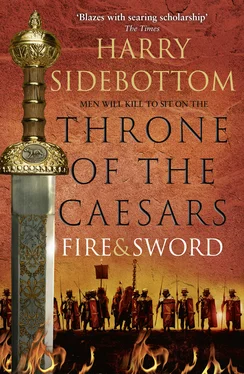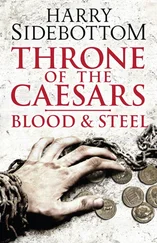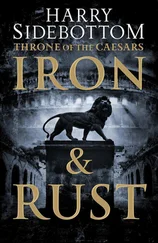‘That aside, there are factors of distance and time. With favourable winds, a despatch might reach Syria in days, but by land or sea an army could not return for months. Maximinus will be upon us long before. We must acclaim one of our own. The Senate already has elected the Board of Twenty to defend the Res Publica . The choice should be made from among their number.’
A low murmur of speculation filled the temple.
Licinius continued. ‘A decision of this importance is not to be taken on a whim. I propose to adjourn the house, to allow time for careful consideration, to seek to discern the will of the gods, and to allow us to mourn the Gordiani with due piety. The Senate will reconvene on a propitious day, when the auguries are good. Conscript Fathers, we detain you no longer.’
The doors of the temple were opened. Light filled the cella , banishing the dark to rafters, corners, and seldom-frequented spaces behind the statuary.
Pupienus wholeheartedly believed in the traditions of the Senate, but he needed to be alone. He told his sons to accompany the presiding Consul home as his representatives, and requested his close friends to join him later for dinner.
It took time for the near four hundred Senators in attendance to make their way out into the sunshine. Some lingered, talking in little groups, covertly eyeing the members of high standing and influence. Intrigue and ambition, two things at the heart of their order, had, at least for the moment, driven out fear. Many looked at Pupienus as he sat unmoving and alone.
Pupienus regarded Marsyas: naked, racked, ribs lifted high, skin stretched, taut and vulnerable. No escape from the knife. Marsyas had challenged Apollo. It had been his downfall, brought him to his hideous end. Marsyas was not the only one destroyed by ambition. Some philosophers castigated ambitio as a vice, others held it a virtue. Perhaps it was composed of both qualities. Pupienus was ambitious. He had risen high. Yet was the ultimate ambition – the throne itself – too dangerous for a man whose life was predicated on a lie? Pupienus knew that if the secret that he had guarded all his life were revealed his many achievements would be as nothing, and he would be ruined and broken.
The temple was almost empty, just a few attendants clearing away the paraphernalia of the meeting. Pupienus’ secretary, Fortunatianus, was waiting on the threshold. Pupienus beckoned him.
Fortunatianus knew his master. Without words, he handed Pupienus the writing block and stylus.
Pupienus opened the hinged wooden blocks, regarded the smooth wax. His mind worked best with something on which to focus, some visual mnemonic. There were only nine of the Board of Twenty in Rome. On receipt of the news would ambition drive others to desert their posts and rush to the city? What of Menophilus at Aquileia, or Rufinianus in the Apennines? Best leave them aside, deal with such circumstances if they arose. For now there were only nine men eligible for election in Rome, only nine men in this strange situation thought capable of empire. He ordered them, and wrote a list, annotated only in his thoughts.
Capax imperii
Allies
Pupienus – Prefect of the City, experienced and resourceful, accustomed to command, yet a novus homo, standing on the edge of a precipice
Tineius Sacerdos – a respectable nobleman, father of the wife of Pupienus’ elder son, loyal, but lacking dynamism
Praetextatus – another nobilis, ill-favoured father of the ill-favoured new bride of Pupienus’ younger son, a more recent friend of unproven fidelity, apparently without competence
Opponents
Gallicanus – a violent, hirsute, yapping Cynic
Maecenas – his intimate, somewhat better groomed, yet still rendered intransigent by philosophic pretentions to virtue
Others
Licinius – a Greek novus homo, once an imperial secretary, intelligent and enterprising
Fulvius Pius – another nobilis, formerly of little account, now growing in stature
Valerian – confidant of the dead Gordiani, not altogether without merit, a follower not a leader
Balbinus – repellent mixture of complacency and cupidity, like the majority of the patricians
Three, including himself, who could be expected to favour the candidature of Pupienus. It could be assumed that Gallicanus and Maecenas, beguiled by dreams of a dead Republic, would oppose any aspirant to sole power. Pupienus needed to win over two of the remaining four. Yet it was not just the men themselves. Everything depended on the votes they could bring. The issue would be decided by decree of the whole Senate.
Which two must he attempt to bring over?
Much would tell against Licinius among traditional Senators: his Hellenic origins – Greeks were naturally untrustworthy – his early employment – a secretary at another’s beck and call – even his intelligence – Greeks were far too clever for their own good, and always, always talking .
Fulvius Pius had a long career behind him, and was distantly related to the Emperor Septimius Severus. Familial ties and propinquities of office might sway a few to his side in the house, but nowhere near enough.
Valerian had been at the heart of the brief, doomed regime of the Gordiani. The death of the principals would have robbed their faction of appeal to the majority of Senators. Yet there were issues to weigh beyond the Curia. Pupienus himself commanded the six thousand soldiers of the Urban Cohorts. All the other military forces near at hand – the thousand Praetorians and seven thousand men of the vigiles in Rome, and the thousand swords of the 2nd Legion in the Alban Hills – were led by equestrian officers, every one of whom was bound by the ties of patronage to the Domus Rostrata , the noble house of the Gordiani. If Valerian was in his camp, Pupienus could put a noose of steel around the Senate House.
And then there was Balbinus. A porcine face on a corpulent body, both bloated by a lifetime of indulgence and perversity. A soul where stupidity vied with low cunning, and profound indolence with vast ambition. It was impossible to measure how much Pupienus despised the man. Yet Balbinus was a kinsman of the divine Emperors Trajan and Hadrian, a member of the Coelli, a clan that went back to the foundation of the free Republic, and, by their own account, beyond history itself, all the long way to Aeneas and the gods. Irrespective of his character, centuries of familial wealth and public honours, an atrium filled with smoke-blackened portrait busts, endowed Balbinus with a status that could command the votes of many Senators.
In politics often emotion must be set aside. Pupienus would have to stomach the patrician’s sneers and jibes. Rome is less your lodging house than your stepmother. Beguile us with your ancestry; tell us the great deeds of your father. But what bait could Pupienus dangle before those slobbering jaws, what prize so glittering that it could pierce Balbinus’ lethargy, and induce him to prevail on his relatives, friends and clients in the Curia to vote imperial honours to a man he regarded as an upstart, little better than a slave?
The honours of an Emperor. Pupienus reviewed the purple, the ivory throne, the sacred fire. In a private enterprise one could press on or draw back, commit oneself more deeply or less. But in the pursuit of an empire there was no mean between the summit and the abyss. To be Emperor was to live on the stage of a public theatre, every movement and word visible. There was no mask. One’s inner being and past were stripped bare. Certainly too close a scrutiny for a man with a secret lodged less than two hundred miles from Rome. If he were to proceed, Pupienus would have to go one last time to Volaterrae, and bury his past. It was a task he had prayed never to have to undertake. Everything decent cried out against it. But to bid for the throne all emotion must be set aside.
Читать дальше












